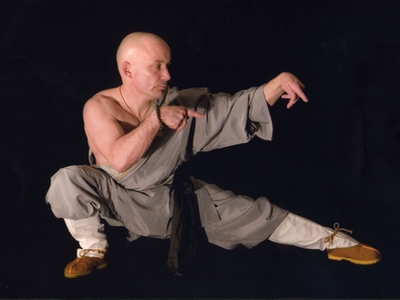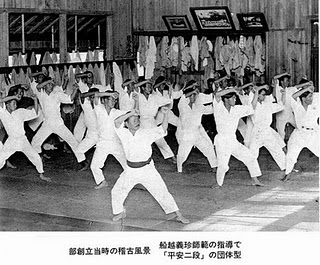It’s often been said that performing Kata/Forms/Patterns (Kata for convenience) is like moving meditation; but what exactly does that mean?
Well first let’s look at meditation then see how performing Kata can be similar. Meditation is a practice which (amongst other things) aims to silence the mind and help focus the intention. There are many variations, but (put very simply) one of the most common methods of meditation is simply to sit and focus all your minds attention on the breath so as to “distract” the mind from other thoughts. With time and practice, you get used to distracting the mind till it gets used to becoming quiet and absent of thought.
Generally speaking, many of our reactions to given situations (including what we would call “thoughts”) are just conditioned responses based on our upbringing and previous life experiences. We often respond to many situations with automatic responses, which have little or nothing to do with actual logical or rational thought or informed choice. Yet the self talk we hear in our heads makes us feel that we are actually thinking rationally and choosing our responses when we’re not really.
A  busy mind with a lot of internal “self talk” can be distracting, cause stress (as self talk is usually negative) and often has difficulty thinking straight. Quieting the internal self talk with meditation can be useful for attaining calmness (cutting out negativity) and helping with the clarity of actual rational thought (cutting out distracting thoughts which don’t help).
busy mind with a lot of internal “self talk” can be distracting, cause stress (as self talk is usually negative) and often has difficulty thinking straight. Quieting the internal self talk with meditation can be useful for attaining calmness (cutting out negativity) and helping with the clarity of actual rational thought (cutting out distracting thoughts which don’t help).
There are also spiritual connotations as many people believe that you can connect to higher spiritual parts of yourself (usually called higher self or inner being). Now I know some people will believe in this and others won’t and it is beyond the remit of this post to argue that case either way.
However, without doubt, it is known that we only consciously use a small percentage of our brain, most people say about 10%. By silencing that 10% that we do have direct access too, we slowly learn to access some of the other 90% (our subconscious). This part does not usually speak to us directly with words or thoughts; but with feelings and intuition which guide us. This can be in a self defence situation, our job, relationships or any part of our life.
Furthermore the human brain takes in enormous amounts of information, most of which our conscious mind filters out (as it would be a burden to be aware of so much insignificant detail every second). However, when we have a problem or seek an answer, the subconscious which has absorbed this vast amount of information can sometimes give us an answer from this vast amount of information, which the conscious mind has filtered out. But we need to quieten our conscious minds long enough to become aware of it.
Now whatever your paradigm (higher self, inner being, subconscious mind); it all works basically the same way. Therefore it’s not worth arguing over which is right or wrong, all that is important is that by silencing the conscious mind we can access a higher level of intelligence/intuition.
So ooooo, back to Kata! Try observing your mind for a while (without meditating). High grade martial artists should have fairly quiet minds already as it is a side effect of our training, so this may not work too well with experienced martial artists. However, you can get your students to try this. Normally, after a while you will notice a certain amount of self talk inside your mind, this is natural.
ooooo, back to Kata! Try observing your mind for a while (without meditating). High grade martial artists should have fairly quiet minds already as it is a side effect of our training, so this may not work too well with experienced martial artists. However, you can get your students to try this. Normally, after a while you will notice a certain amount of self talk inside your mind, this is natural.
Then choose a Kata that you know well and can perform without having to think or concentrate on. As you perform that Kata, put just a small part of your attention into observing your own mind. If you know the Kata well, you should notice that your mind falls silent as you flow from one movement to another to another, without the need for thought. The use of breath in meditation for distracting unwanted thought is replaced by the well rehearsed dynamic, fluid and powerful movements of the Kata. Instead of conscious thought there is intension, focus and a sureness of purpose. Ironically, some Kata movements can be quite complex, detailed and demanding; yet rather than thinking about them, we shut of thought to perform them!
The same is true of course of basics, but they are generally shorter, giving less time to gain the benefit.
If we can perform complex movements and turns; with power, grace, speed, balance, accuracy and poise better without conscious thought than with thought, surely that’s a lesson for other areas of our life. I’m not suggesting that we stop thinking altogether, but silencing the mind can bring benefits to many other areas of our life. It does actually help us to think more clearly and to an extent helps us overcome our automatic responses to situations where we respond from conditioning rather than from any rational thought.
Imagine a situation for example where one person picks a fight with another. Often the person being picked on (especially young men) will respond with a conditioned response such as, “who’s he think he’s talking to” or similar and actual clear rational thought has nothing to do with it. Being able to clear away the “who’s he think he’s talking to” self talk actually allows us to take the ego out of the situation, think more clearly and find a way out without having to resort to a pointless fight. With rational thought rather than conditioned response, we would usually observe a fool trying to intimidate us and why on Earth would we value the opinion of a fool? If we do not value the opinion of the fool, then it is easy to walk away and NOT be provoked by it! Why would a fools opinion be provocative? Isn’t that very rational and logical?
This is not an overnight thing, but slowly over long periods of time, we gain access to the deeper parts of our mind and intuition.
There is of course a lot more to it than what is covered here, but this is just a blog post and this subject could take a book. Please leave your comments below and let me know what you think?

 busy mind with a lot of internal “self talk” can be distracting, cause stress (as self talk is usually negative) and often has difficulty thinking straight. Quieting the internal self talk with meditation can be useful for attaining calmness (cutting out negativity) and helping with the clarity of actual rational thought (cutting out distracting thoughts which don’t help).
busy mind with a lot of internal “self talk” can be distracting, cause stress (as self talk is usually negative) and often has difficulty thinking straight. Quieting the internal self talk with meditation can be useful for attaining calmness (cutting out negativity) and helping with the clarity of actual rational thought (cutting out distracting thoughts which don’t help). ooooo, back to Kata! Try observing your mind for a while (without meditating). High grade martial artists should have fairly quiet minds already as it is a side effect of our training, so this may not work too well with experienced martial artists. However, you can get your students to try this. Normally, after a while you will notice a certain amount of self talk inside your mind, this is natural.
ooooo, back to Kata! Try observing your mind for a while (without meditating). High grade martial artists should have fairly quiet minds already as it is a side effect of our training, so this may not work too well with experienced martial artists. However, you can get your students to try this. Normally, after a while you will notice a certain amount of self talk inside your mind, this is natural.
 This can sometimes be achieved quite quickly, but sometimes it can take years. How often have you knelt there thinking “my knees hurt”, “how long is this going on for”, “I hope we do sparring tonight” or “I hope we don’t do sparring tonight”, whatever!
This can sometimes be achieved quite quickly, but sometimes it can take years. How often have you knelt there thinking “my knees hurt”, “how long is this going on for”, “I hope we do sparring tonight” or “I hope we don’t do sparring tonight”, whatever!